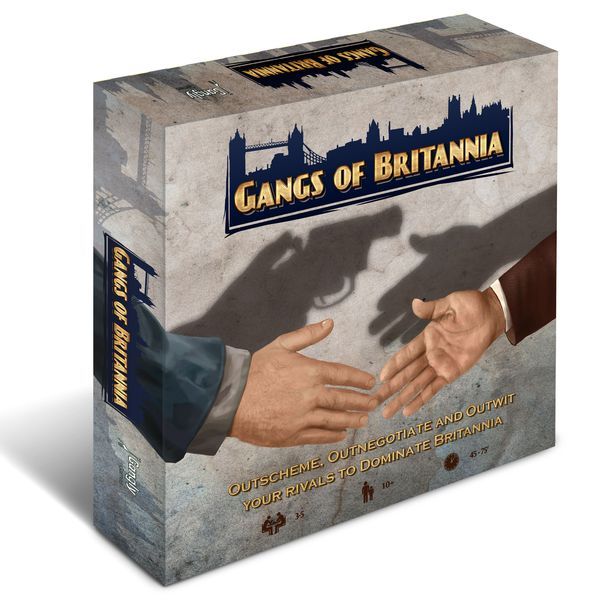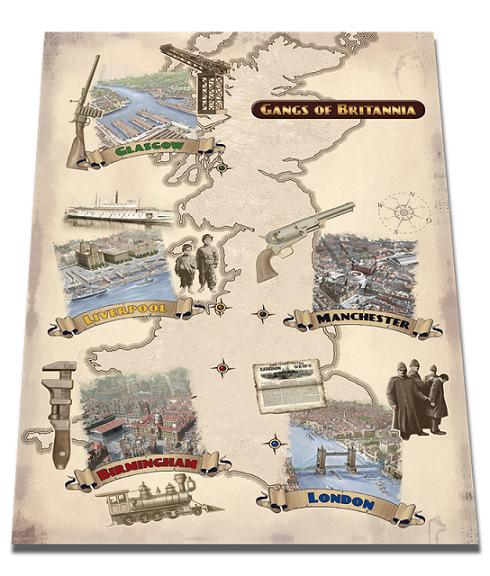Gangs of Britannia: A Game of Negotiation and Deceit

Take charge of a notorious gang during the Victorian era and fight for control of five cities across the UK.
Players must move their gang members from city to city, striking deals with opponents, sometimes breaking those deals, and always trying to stay one step ahead of the law.
Gameplay
In Gangs of Britannia each player selects a gang to be in charge of. The game board shows five cities across England and Scotland, each of which is the home base for a different gang. The game is played in three rounds, with each round being played more or less the same.
At the start of the round, turn order is determined (in round one this is done by rolling a die, in subsequent rounds it is the player with the least number of mob meeples on the board). Next, each player is dealt a city card faceup and an intel card facedown. You may look at your own intel card. The intel card will tell you some effect that will take place at the end of the round in the city you were dealt.
Next there are two seasons. During a season, each player takes a turn placing one of their mob meeples on any city, and then may choose to move one meeple to a new city. At the end of each season, for each city, if more than one player has a meeple present in that city, the players with meeples there must negotiate. They may discuss what they plan to do, but they are allowed to lie. Each player then places a card facedown, the card will say either deceive or deal. After all city negotiations have been completed, all cards are flipped over. For each city: if all players in a city used a deal card, everyone receives $3000. If only one player used a deceive card, he places an extra meeple in the city and removes another player’s. Finally if two or more players used a deceive card, than each of them loses one meeple from that city.
After both seasons have been completed, the round moves on to intel cards being revealed. These have a number of different effects, such as forcing players present in the city (the intel card targets) to lose money or meeples, or possibly even awarding them money.
Next players earn money. You earn $1000 for each meeple you have on the board and an additional $3000 if you have the most meeples in your gang’s home city. Then players receive one free upgrade for each city in which they have more meeples than any other player, and may then choose to purchase upgrades. Upgrades are card with special abilities that you can play one time before returning them to the upgrade deck.
Finally, the round ends with a police raid. The city with the most meeples on it is hit, and all players in that city must remove their meeples from it until they each have only one meeple left in that city. Then the next round begins.
After three rounds the game ends, and the player with the most money wins.

Review
At first glance Gangs of Britannia looks more complex than it is, and it can run over an hour. But if you look closer you realize it’s a fairly straightforward and easy to learn game. Players are simply moving and placing their meeples and then trying to strike deals with one another.
The player interaction in the game is superb. Trying to guess if another player will play a deal or deceive and figure out if you can actually trust them, brings a fun social deduction element to the game, with each negotiation making each subsequent negotiation trickier. The game is playable, and even fun, with three players, but the player interaction is strongest with at least four.
You are also trying to figure out and guess what intel cards each player has. Does it look like they’re avoiding the city they have a city card for? Are they doubling down on it or just trying to fool you? And how well can you hide what you know from other players as well?
The component quality of the game is in general pretty good. The artwork fits well, and both the cards and board are well made (though the board is rather oddly made up of six map tiles rather than being one solid board). However, some of the graphic design could be stronger: for example, the rulebook is written in a white font against a grey speckled background that’s a strain on the eyes to read. However, the player boards, with a step by step guide for each round, are incredibly helpful.
If you enjoy social deduction in your games, Gangs of Britannia blends it quite well with worker placement and area control. Check it out for yourself and see if your gang will come out on top!
Pros: Great player interaction, good artwork
Cons: Graphic design could be improved, better with more than three players, can run long
Disclosure: we received a complimentary review copy of this game.






